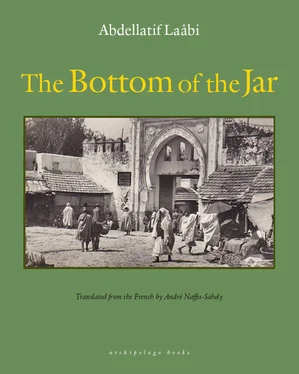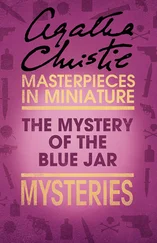It’s springtime in Fez. We can dwell a little on this without sliding into lyricisms to describe its splendor. The sky opens its dance card, flips through its pages of fluid blue, its openness a purveyor of dew that invites the light to a dance where only the fingertips touch. The music is the work of the master of silence, skilled in the art of proportions and using only the lightest of touches, letting out only a few sounds and voices — happy harmonies that flow into the city to compose the eternal symphony of a world tightly wrapped in its own secrets.
It is the time when Fezzis — those incorrigible city dwellers — feel the need to air themselves, reconnect with nature, feast their eyes on something green, and gaze at God’s sky. They call this the nzaha . There were orchards to be found in the immediate vicinity of the Medina, where they could give themselves over to rustic pleasures without going out into the countryside. If someone didn’t happen to own such an orchard, there would surely be a friend who might lend them the use of one for a day. One had to take advantage of one’s extended family. Early in the morning, a donkey would be loaded with all the essentials — a mattress, blankets, provisions — and the whole family would head to the orchard.
The orchard Namouss discovered that particular spring could be found at the exit of Bab Lahdid, down the slope that led to Bab Jdid. It was a walled-off vegetable garden dotted with a number of fruit trees that were watered by the irrigation channels snaking alongside them, and it also had a well with stone foundations. In the shadiest spot was a spacious nouala , which resembled the one Driss had rented in Sidi Harazem. The entire family was there. Making an extremely rare appearance was Uncle Si Mohammed, along with his wife and children. Uncle Touissa was expected to arrive toward the end of the morning, when he would rouse from his kif-induced stupor.
Ghita’s mood, always unpredictable, on that day was particularly colorful. Abruptly deciding “not to get her hands dirty,” she folded her arms and assigned all her chores to Zhor, her eldest daughter, and to Zhor’s cousins.
“Why,” she asked, “should my shoulders bear all the burden? Am I not also a Muslim? At least for once in my life I have the right to sit and scratch my head and ‘heed my bones.’ Anyhow, it’s not like there’s much to do! The kofta and the kebabs are seasoned already. There’s nothing left to do but stick them on skewers and fire up the barbecue.”
Having said her fill, she stretched out on the mattress inside the nouala , indifferent to the commotion taking place around her and the bewitching spectacle of nature outside.
Namouss knew his mother’s sulk wouldn’t last long. Sooner or later her hands or tongue would get itchy. Eventually she would involve herself in this or that, discharge the girls from their duties, and take over the preparations of the lunch. Namouss knew Ghita like the back of his hand. Her behavior that day had a simple explanation: the presence of his aunt, with whom Ghita had never settled the score since their disastrous cohabitation many years earlier when she and Driss were newlyweds. Faced with the woman who had assumed the role of stepmother and had always treated her like a servant, Ghita now needed to make a show of the skills she had acquired and the independence she had won for herself. So there!
After formulating this diabolical analysis, Namouss decided to let go of his mother’s skirt and wandered off into the garden. Not far from the well, he stumbled on the spot where the men had assembled around his uncle, basking in the glow of his words while they waited to sip their tea. He stopped, out of politeness. Having noted his presence, Driss invited Namouss to sit down.
“Come listen to what the haji, your uncle, has to say about Mecca and Medina, my son, and may God not deny us the chance to visit these holy places.”
Haji Uncle Mohammed had actually just returned from his pilgrimage. Namouss knew all about it. He’d seen the gifts Uncle Mohammed had brought back for his parents. Ghita had received a vial containing holy water from the well of Zamzam. Driss was given a. . burial shroud. What a bizarre present, Namouss thought, on seeing that ordinary-looking piece of white cloth, exact replicas of which were to be found on sale every day at the Kissarya. But Driss, ecstatic, insisted it was the best present one could bring back from over there. So there you have it!
Haji Mohammed weighed his words carefully and intoned them with a baritone that came deep from within his chest. There was a catch in his throat as he spoke.
“If you have never gone near these blessed places, rest assured you’ve seen nothing yet. Over there, the heart opens so that it may be washed clean of earthly sins. The light of faith floods over it. You no longer suffer from heat, hunger, or thirst. That was when we’d left the valley of Mina heading toward Mount Arafat. We had passed through Muzdalifa and around noon were in sight of the Mount of Mercy. When we got there, we began to pray and to recite the Qur’an, carrying on until sunset. How can I express what we felt at this stage in our pilgrimage? Yes, dear ones, we had come closer to God and were surrounded by His glory, which in turn surrounded the whole world wherever Muslims would be found. After that, we quickly made our way back to Muzdalifa, where we camped out waiting for dawn. We no longer felt the need for sleep. On the following day, when we set out for Mina, we felt refreshed, as if we’d had a good night’s sleep. It was the tenth day of Dhu al-Hijjah, the Feast of the Sacrifice. We had carried out the stoning of the devil earlier that morning. With each stone cast against Satan, his oldest and youngest son, we freed ourselves of our sins and shielded ourselves from the ruses the devil and his descendants had in store for us. Then we all lined up to pray in unison, as if we were one. The songs of angels reached our ears, blending with the chorus of blessings our loved ones were sending us from the beyond. At that moment — and pay close attention to what I’m about to tell you — I raised my eyes to the sky and the face of Haji Abdeslam, my departed father, came before me, aglow in light. From his murmurs I understood he was calling for me to follow him. I felt very grateful toward him. My immediate and dearest wish was to prostrate myself and recite the Shahada and never get up again. Could a believer wish for anything greater than to bring peace to his soul and be buried in the land that had been privileged to see the birth of our Beloved, and which at the end of His life had welcomed His perfumed body?”
At the conclusion of this speech, the assembled men rose in a unanimous Allahu Akbar! Their eyes were wet, their spirits seized by a sweet reverie. A simple question, asked by Haji Mohammed’s eldest son, broke the spell.
“How are the Muslims from other countries?”
“There are whites and blacks, as well as Chinese, Indians, Persians, and even Russians. Not many among them spoke our language. We were obliged to use sign language to communicate. Neither do they eat like we do. I must say that when we Moroccans shared our food with our closest neighbors, they were full of admiration. You can find the whole world in Fez, gentlemen. Our cuisine knows no equal. Is there anything better than a beef tagine with stewed vegetables, roast chicken with pickled lemons and olives, pigeon pastilla with almonds, or our traditional seven-vegetable couscous? One day I allowed myself to be tempted by a group of Indians who had invited me to taste one of their dishes. I won’t let that happen to me again. One mouthful was enough. It was like the fires of Gehenna. I almost choked. On another occasion, a group of Tunisians offered me their favorite dish: mloukhiya. At first I thought it would be made with okra, which, unlike your uncle Touissa, I very much like. But when they served me the dish, I saw before me a blackish-greenish stew whose smell made my stomach turn. I dipped my bread in it out of politeness. It tasted like henna and the meat that came along with it was like rubber. May God protect us!”
Читать дальше












